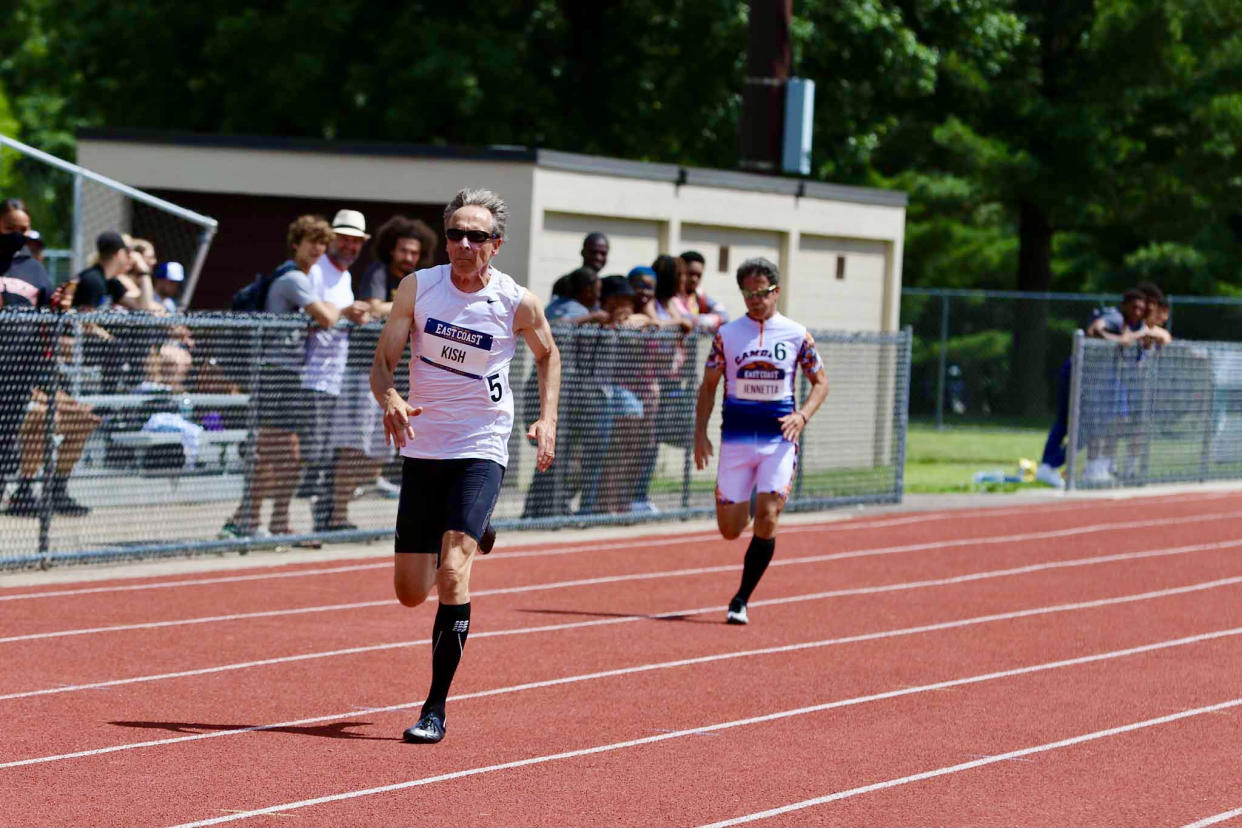Meet the Usain Bolt of 71-year-olds
Shortly before his 60th birthday, Michael Kish began to run out of friends capable of keeping up with him.
His buddies complained they were too old for full-court basketball, too brittle for pickup hockey, too broken-down for even organized softball.
“They all decided to retire or gave excuses that this hurts or that hurts,” Kish told Yahoo Sports. “The teams I played for kind of disappeared, and I was frustrated sitting around.”
Unwilling to accept that growing older had to mean slowing down, Kish hunted for an individual sport that would keep him active and satisfy his appetite for competition. The middle-school special education teacher eventually found his answer in a sport that he dabbled with in high school but hadn’t tried again in more than 40 years.
Stumbling across a brochure for the 2012 New Jersey Senior Olympics rekindled Kish’s former interest in track and field and led to him rediscovering his calling. At age 71, Kish has blossomed into the Usain Bolt of septuagenarians, a viral sensation whose speed defies his age.
Last year, Kish ranked No. 1 in the world in the 70-and-over age group in both the men’s 100 and 200 meters. This year, the lifelong New Jerseyan has already matched or beaten his fastest 2021 times in both short sprints, putting him in strong position to retain the title of masters track and field’s fastest retiree.
“It’s amazing,” Kish said. “I had no clue where I was going to go with this. I just wanted to do as well as I could.”
Kish’s stunning second act in track and field begs the question what he might have achieved in his athletic prime had someone recognized and cultivated his talent. He doesn’t recall receiving much hands-on instruction in the late 1960s as a varsity long jumper and sprinter at Essex Catholic High School, then an all-male institution, in Newark, New Jersey.

“My coaches would tell me, ‘Go run 10 100s. See ya later,’” Kish recalled. “I remember only one time they came down, looked at me jumping and gave me a few pointers. Otherwise, basically, I was on my own.”
With no scholarship offers after high school, Kish put track and field in his rearview mirror. He devoted his professional life to helping kids in need, deploying his speed only when beating friends down the floor during pickup basketball games or when turning a single into a double on the softball diamond.
When he finally returned to track and field a decade ago, Kish was a novice in every way. He had to ask if he should wear track spikes in his first race. His strategy for that 200 at the New Jersey Senior Olympics? “To run as fast as I could,” he says with a laugh.
Kish placed second that day in 29.2 seconds, a promising enough start to motivate him to train harder and become more knowledgeable. He combed YouTube for instructional videos, teaching himself how to burst out of the blocks, lean forward through the drive phase of a race, glide through the turn, maximize his top speed and maintain proper form through the finish line.
If the self-taught Kish wasn’t studying sprint mechanics, he was putting what he learned into action. He started practicing three days a week and strength training at the gym another two days on top of that, strategically ramping up the intensity to be in peak form each summer for the end of the outdoor season.
The payoff for that hard work arrived rapidly in the form of lower times and improved rankings. By 2015, he was running sub-13-second times in the 100 and sub-27-second times in the 200. Kish approached or even duplicated those times as he got older, enabling him to consistently crack the top five in the world rankings in the 65-and-over age group and to ascend to No. 1 in the 70-and-over category.
“My rankings and my times have gotten better as I’ve gotten older,” Kish said. “That’s what I look for at the end of the season is where I’m ranked. It’s motivating for me because it makes it more competitive.”
Occasionally, Kish will enter races that require him to run against men decades younger than he is. While Kish can’t often beat them, he’ll challenge himself to keep up with them for as long as he can in hopes they’ll drag him to another fast time.
Masters track and field athletes typically compete in anonymity, but Kish’s eye-popping speed drew some unexpected attention last month. A clip of him annihilating the 70-and-over field in the 100 at the Penn Relays spread quickly on social media and left viewers awestruck.
Michael Kish wins Penn Relays 70-year-old 100m race in 13.47!! 🤯
📺: https://t.co/PVPuMyyitJpic.twitter.com/Cyrn2toBDa— FloTrack (@FloTrack) April 28, 2022
“He would have smoked me when I was 18,” one Twitter commenter wrote.
“Get that man’s birth certificate,” another joked.
To Kish, the irony of the attention was that his time of 13.47 seconds was merely an early-season barometer of how his training was going. This past weekend in Florida, Kish ran a 13.13 to take first place in his age group at the National Senior Games. He claimed first in the 200 in a blazing 26.89 seconds, more than a second faster than the runner-up.
While Kish hopes to improve on those times later this summer, maintain his No. 1 world ranking and continue his remarkable late-life success, the retired special education teacher does have a more wide-reaching goal.
“Hopefully my story,” he says, “will inspire at least one person my age to get off the couch and go for a run.”
